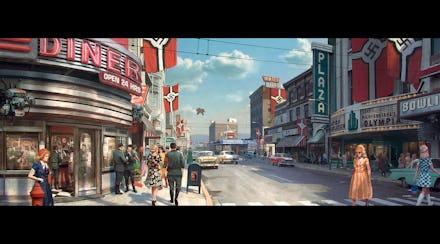Yes, ‘Wolfenstein 2’ is about Trump and the alt-right — even if it was never supposed to be

I’m walking through a detailed recreation of downtown Roswell, New Mexico, in 1961. Confetti falls from the sky against a backdrop of Nazi flags as Americans parade through the streets, happily celebrating the anniversary of the German victory over the U.S. in World War II.
Wolfenstein II: The New Colossus, an upcoming video game from Bethesda Softworks, the company behind critical hits like Skyrim and Fallout 4, takes place in an alternate history where we lost WW2. In this world, Ku Klux Klan members walk the streets in broad daylight, a passive population lives in the aftermath of Germany’s victory and the resistance struggles to hold on.
When the game was announced in June at 2017’s Electronic Entertainment Expo, it quickly drew speculative comparisons to the rise of modern fascism — from both the left and the right. After playing a three-hour demo of Wolfenstein II for myself, I can confirm that it’s eerily relevant in today’s political climate — even if its creators never meant to turn their game into an allegory for Donald Trump and the alt-right.
In the game, I turn the corner and stop to inspect a news clipping taped to the window of a local gas station. The fictional Star-Spangled Daily reads like Fox News, Breitbart and Trump’s Twitter account all rolled into one. It’s pure propaganda, presumably created after the Germans won WW2 and put the editor-in-chief of an actual newspaper on trial for an “untruthful editorial spreading harmful lies.”
In a single paragraph, it encapsulates Trump’s all-out assault on the “lying” media. The only thing missing are the words “FAKE NEWS.”
These words also bring to mind another modern-day fascist: Richard Spencer. The white nationalist leader, who currently heads the National Policy Institute in Washington, D.C., gained mainstream attention after giving a controversial speech at in November, shortly after the presidential election, in which he used the term “Lügenpresse” — a word used in Nazi Germany that translates to “lying press.”
Spencer ended his speech to a handful of raised, open palms, shouting, “Hail Trump, hail our people, hail victory!”
The America of Wolfenstein II is filled with small moments like these. In one vignette, a pair of 20-something men discuss how the Germans have cleaned up the American movie industry and removed the “filth” Hollywood used to peddle.
Just down the street, a Nazi berates a pair of hooded KKK members for not studying their German before peacefully sending them on their way.
I’m sure there are even more small bits of fascist Americana hidden throughout downtown Roswell, but I couldn’t explore for too long. I was on a mission to blow up a secret underground Nazi base, and my time was running out. (This is a first-person-shooter video game after all, and a great one at that — but I’ll leave those details for the rest of the gaming media to fill in.)
It’s not hard to draw a line between the story of Wolfenstein II and the issues facing America today, but that was never the goal. In a Skype interview with other journalists, creative director Jens Matthies explained that the story was developed around the time Wolfenstein: New Order was released in 2014, long before Trump, Brexit and the alt-right.
The decision to bring Wolfenstein to the U.S. simply came down to what locations would make for a fun video game, but what came next hit a little too close to home.
“We love the idea of having this very recognizable Americana subverted by Nazi ideology,” Matthies said. “How would Nazis approach this country founded on the idea of freedom and try to subvert and corrupt it?”
He said the team drew influence from a variety of books, movies and life experiences to help create this Nazi-run America. He purposefully avoided watching or reading The Man in the High Castle, which hits on similar themes in an alternate history where the U.S. loses WW2.
Matthies wants his game to exist as a self contained piece of art — though he’s not denying the parallels between Wolfenstein II and modern politics.
“Any story you tell is intrinsically a commentary on life,” he said. “With Nazis, it’s obvious. There are real-world Nazis today. There might be occasional jokes, but we want the game to stand as a creative piece on its own that’s timeless.”
Matthies’ position isn’t unique. Detroit: Become Human also made a splash at E3 2017 thanks to a mix of stunning graphics and a story that seems to hinge on violent resistance, mixing a robot rebellion in the late 2020s with modern political imagery. However, in multiple interviews, director and writer David Cage denied imbuing the game with any sort of meaning at all.
“There is no big message to humanity in this game,” Cage told the Verge. “It’s just interesting questions that may resonate with your own personal values and just confront you with the consequences [of your] actions.”
Matthies offered a similar explanation for Wolfenstein II, boiling the series down to universal, human themes instead of tackling the issues he’s presenting head-on. “For the first game, it was dogma,” he said. “For this one, it’s catharsis.”
Regardless, it will be hard to play through Wolfenstein II when it releases this October and not think of Trump’s America. Thankfully, this is a video game, free from ethical concerns and moral gray areas. Your mission is simple: keep killing Nazis and you’ll eventually make it through to the end and save America. If only the real world were that simple.